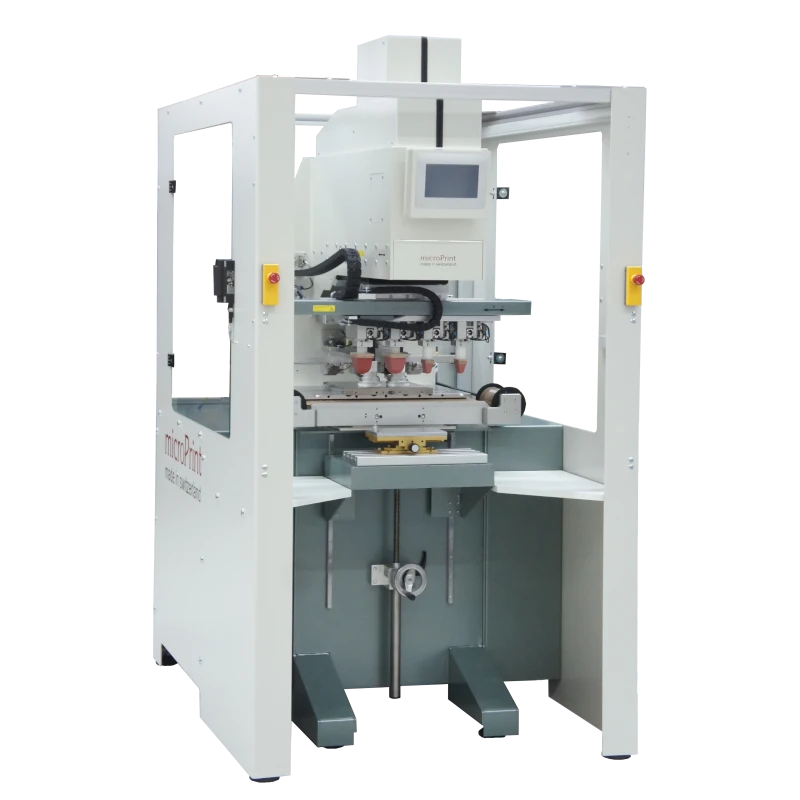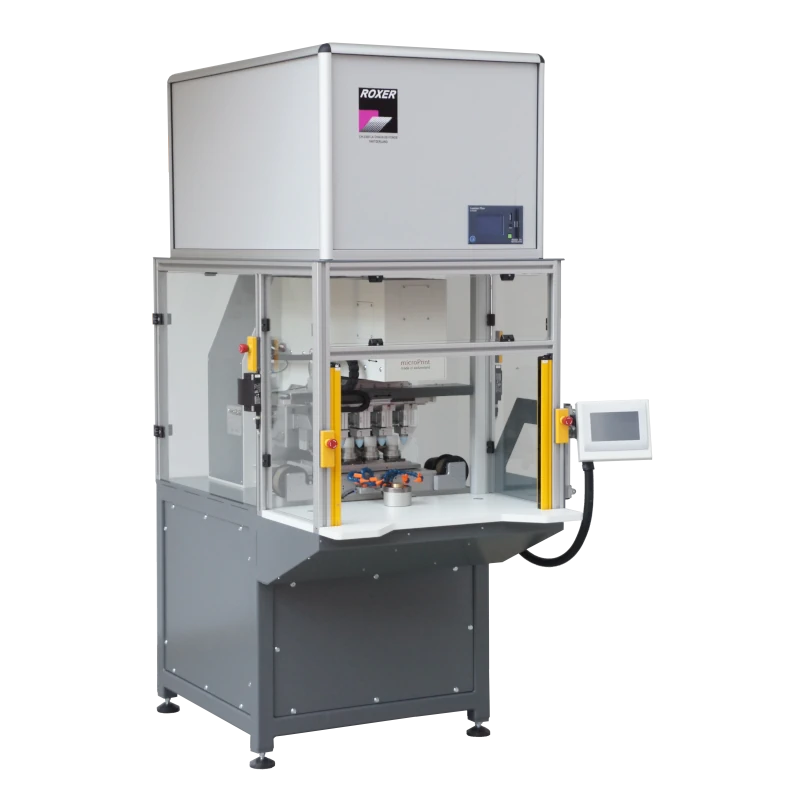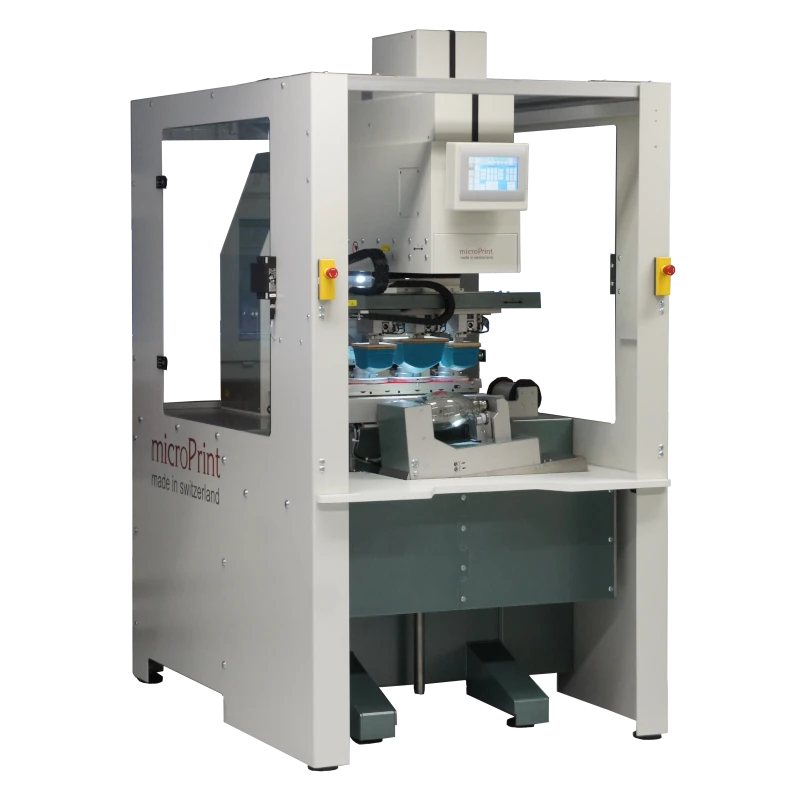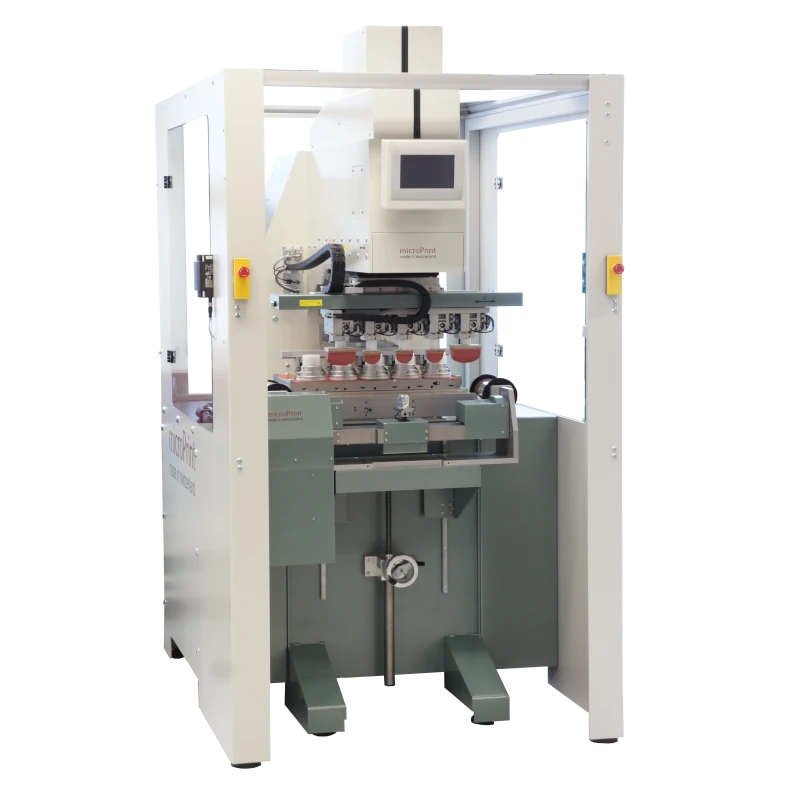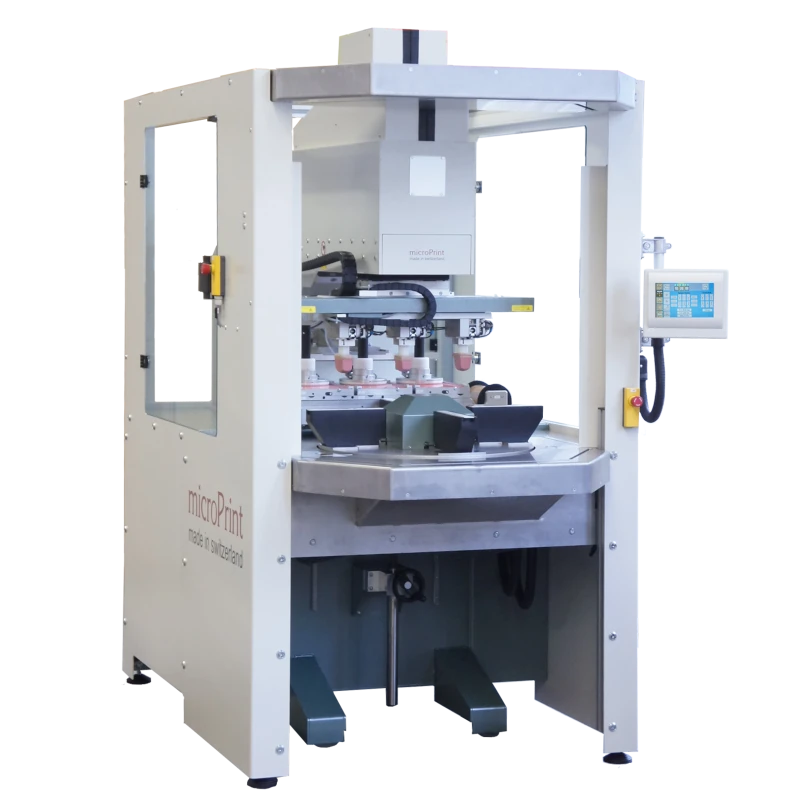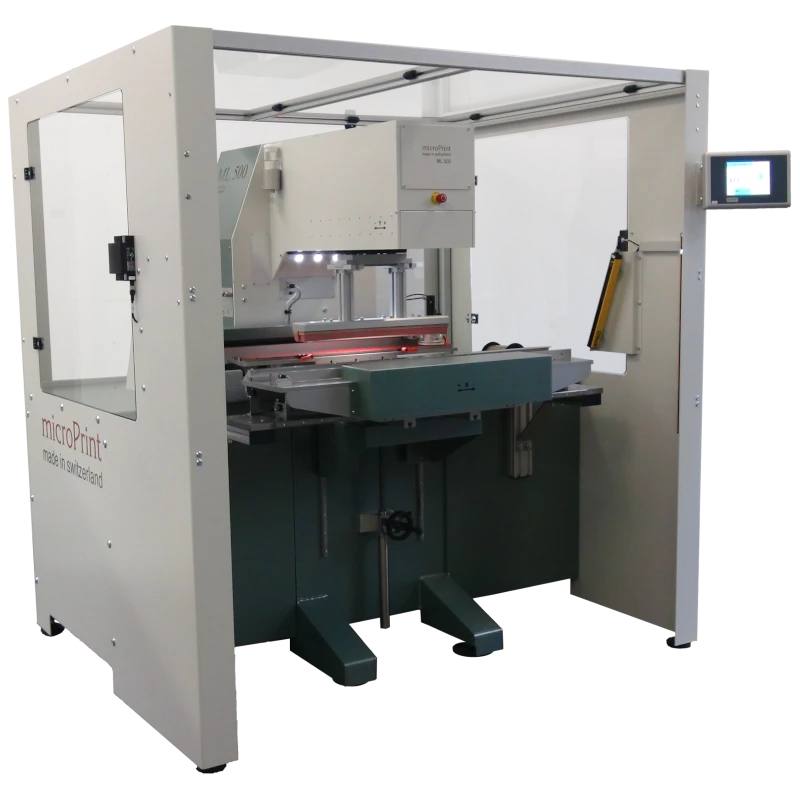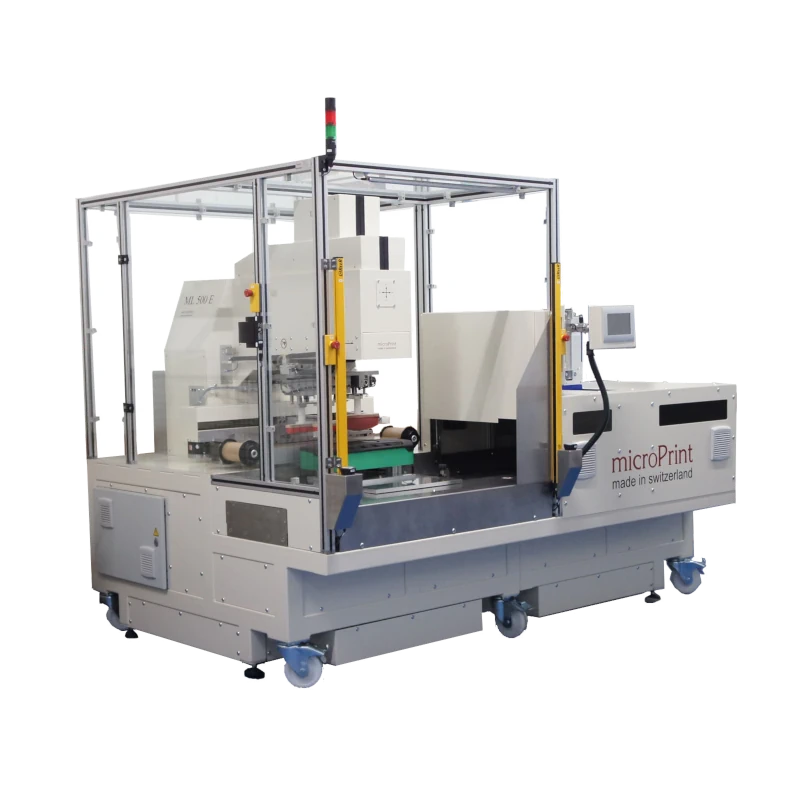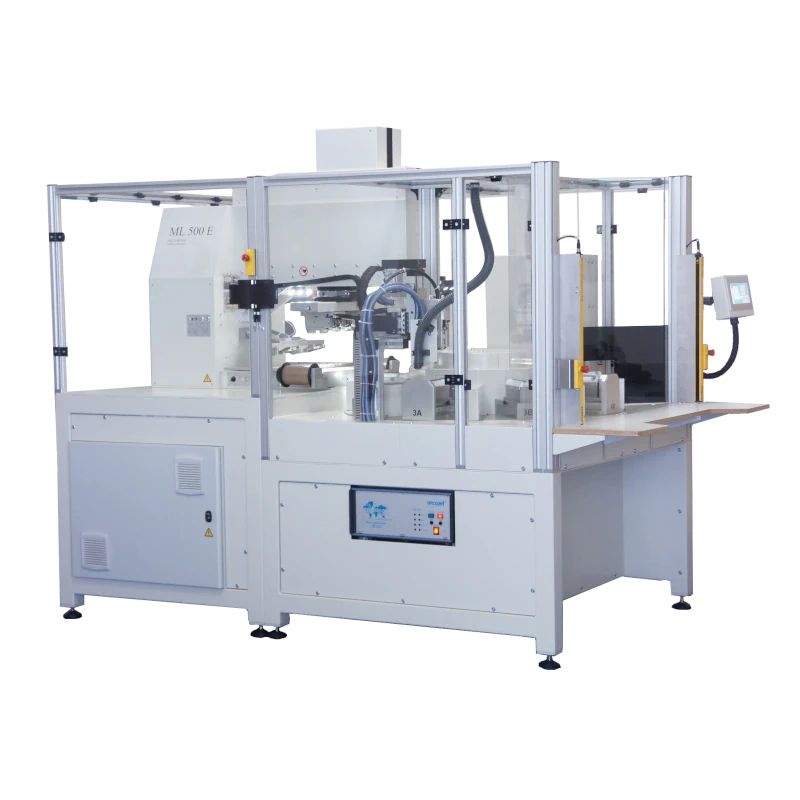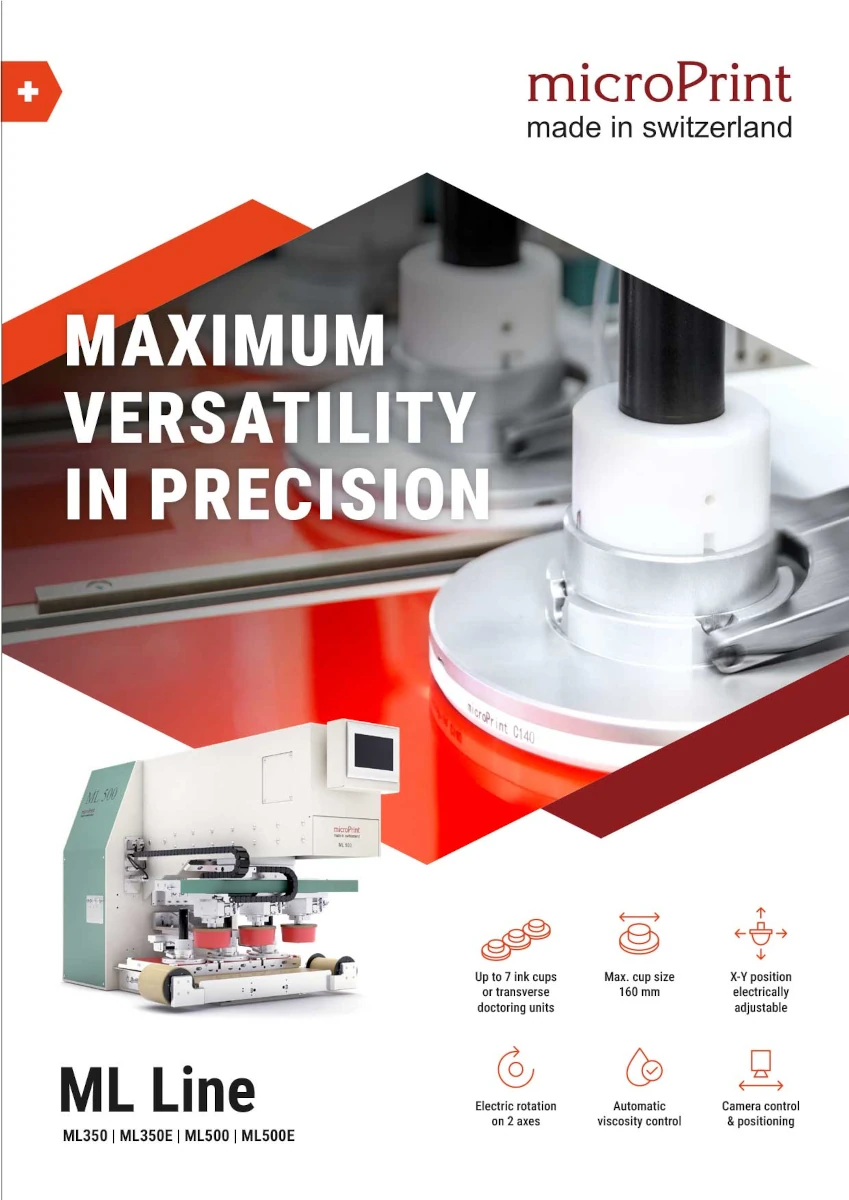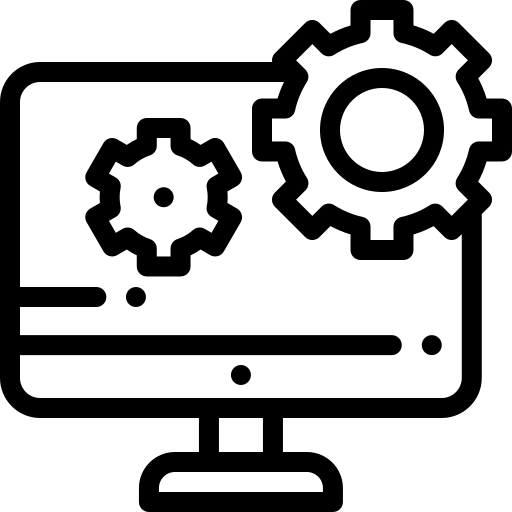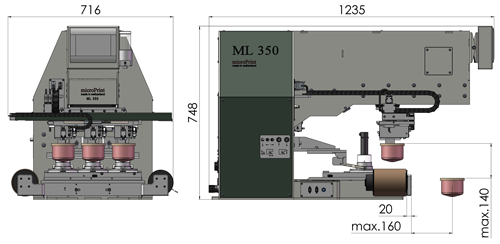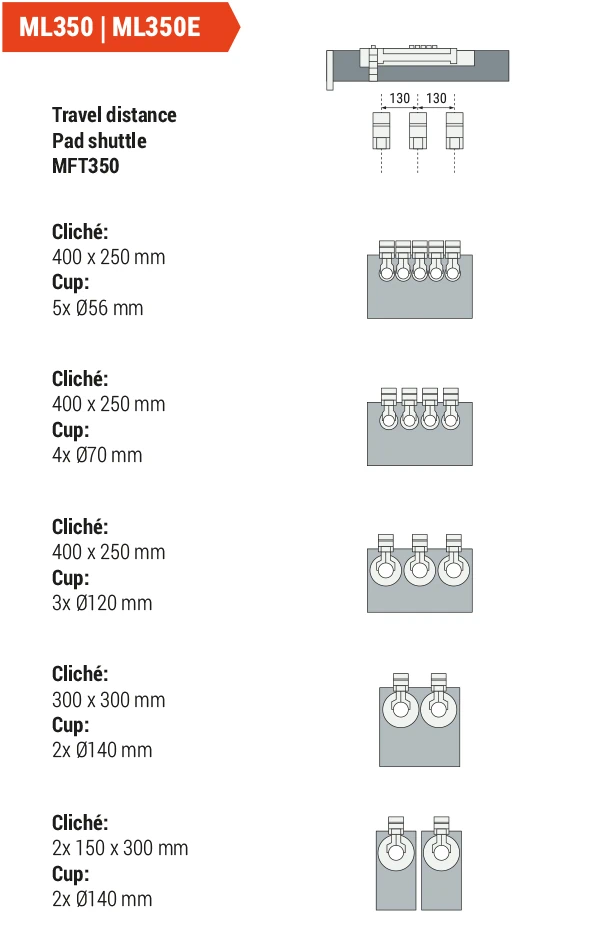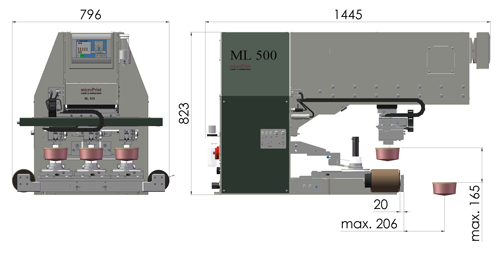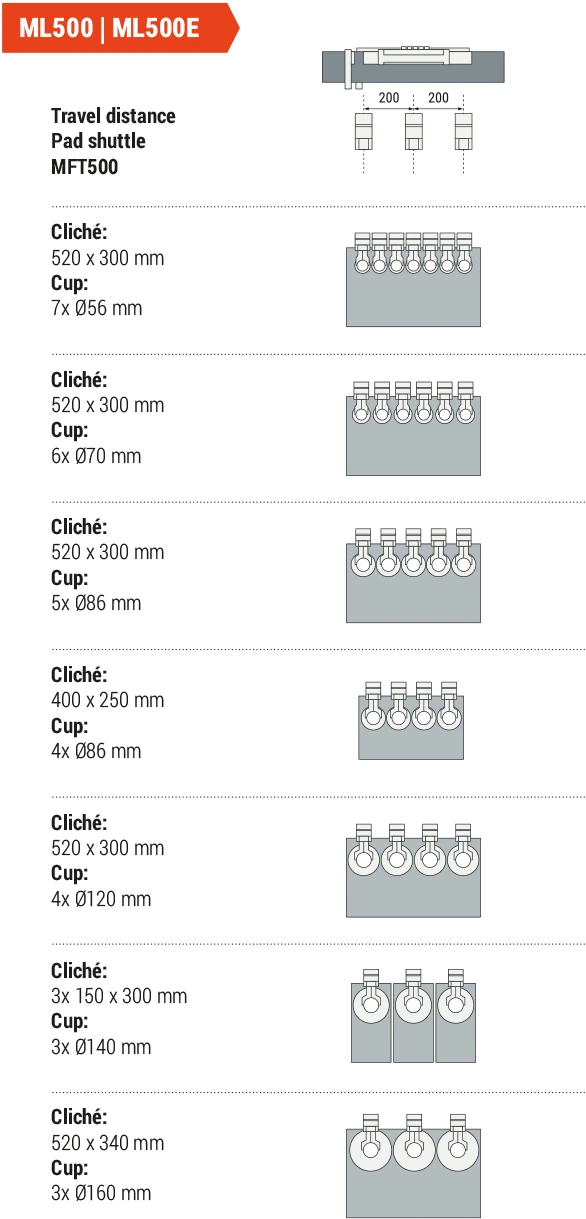ML Line
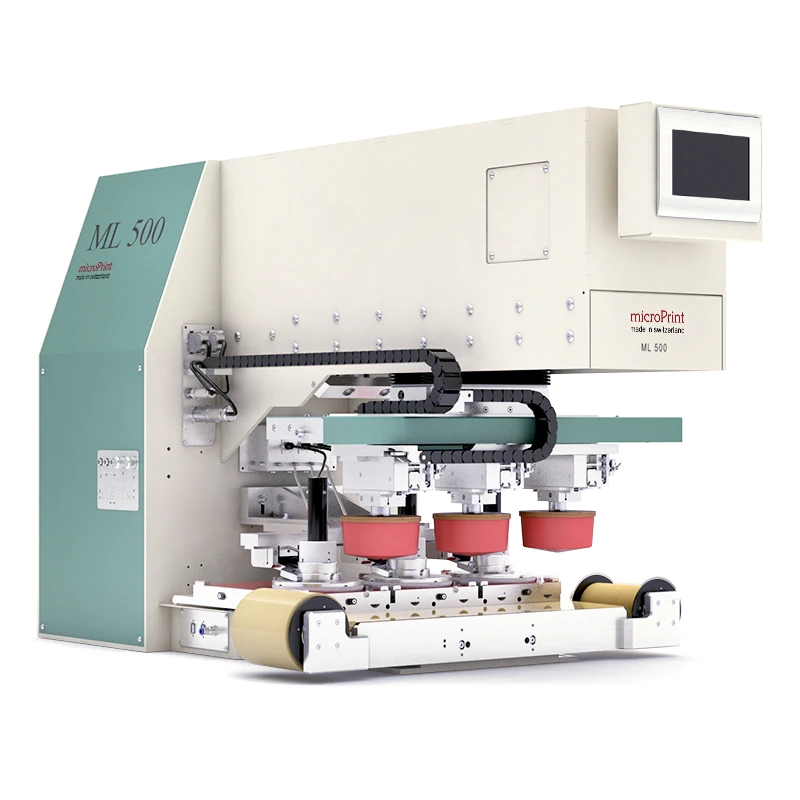
The ML line features multicoloured pad printing machines with electric positioning and an optional
pneumatic or electric pad stroke. The printing positions are adjusted through the graphic,
multicoloured touchscreen display. The printing procedure can be programmed as desired.
It is possible to position many different print images on a single printing cliché. These can be
individually controlled, so that complex composite images or different variations can be printed.
The data belonging to each order are saved and can be recalled for repeat orders any time,
which significantly decreases the required adjustment time.
Printing positions can be corrected in real time by camera or through the interface of a
superordinate system. There are many options available for parts handling: from pneumatic shuttle,
electric rotation on two axes using vacuum clamps and parts sensors, to correcting the position
of individual parts by camera.
Applications
The ML line is versatile and can be used as a manual workstation with a security cell or integrated into a system. It is suitable for complicated parts with multiple images printed in various positions as well as for applications which require a high degree of precision throughout the entire printing process (e.g. for multicoloured images with fine structures or screen printing). It’s also ideal for parallel printing on multiple parts within an injection moulding machine. The electrically powered stroke ensures optimal performance for sensitive printing processes (including printed electronics, opaque or translucent printing and printing on rough surfaces or glass).
Inkwell
Capable of printing up to seven colours using 56 mm doctoring cups, the ML line can also handle up to three colours with a maximum cup size of 160 mm. Various intermediate sizes and different cup combinations are available. The surface pressure of the magnetic doctoring cups can be increased by a pneumatic holder on request. The variant with transverse doctoring unit is used for very long print images, or for the unwinding device. If the optional microPrint Viscomat is installed, ink viscosity inside the cup is regulated automatically.
Pad positioning
The X and Y position of the pad is adjusted in 0.01 mm increments through the display and controlled by linear motors. The pad stroke can either be executed pneumatically or electrically using a servomotor and spindles. In the case of a pneumatic stroke, the speed is controlled by a throttle. The electric pad stroke offers different speeds on the up and down stroke for every single step – up to and including setting the length of time the pad remains in contact with the print object. It is possible to use up to five selective pads. The angle is set mechanically at the cliché holder.
Parts handling
Standard models feature two toolport interfaces for connecting simple handling devices (such as vacuum boxes, parts sensors, clamps, pneumatic shuttle or rotation, or controlled jets of ionised air). The ML line can be optionally fitted with rotation on one or two axes or a simple shuttle for integrating any pre- or post-treatment devices, camera controls or robotic loaders.
Operation, software and interface
peration is performed through the graphic, multicoloured touchscreen display. Printing procedures can be programmed in simple steps with the help of a user-friendly visual representation. The ML line features a galvanically isolated digital interface and an Ethernet connection for updates and back-ups of order data. Optional system communication enhancements include Profinet, Ethernet/IP or EtherCAT. To integrate operational data recording, an optional OPC UA interface is available.
Accessories
For standalone operation within a system, we recommend at least pad cleaning control and the Viscomat. For top requirements regarding product safety, filling level gauges for both units may be added, as well as additional sensors for temperature and humidity. Cliché cooling is available to minimise temperature effects on colour transfer time and on the ink’s pot life. Safety cells can be specially designed for sitting or standing workstations. These can be equipped with an additional rotary indexing table and a laminar flow to minimise dust.
ONE SOLUTION – ENDLESS POSSIBILITIES
Are you looking for a tailored solution to meet your needs?
The ML line offers a broad range of configurations to meet your
specific needs, ensuring maximum precision, flexibility and versatility.

Introduction video
System options
Part shuttle or plate system
Camera control & positioning
Rotary index table for pre- & post-treatment
Robot loader
Examples
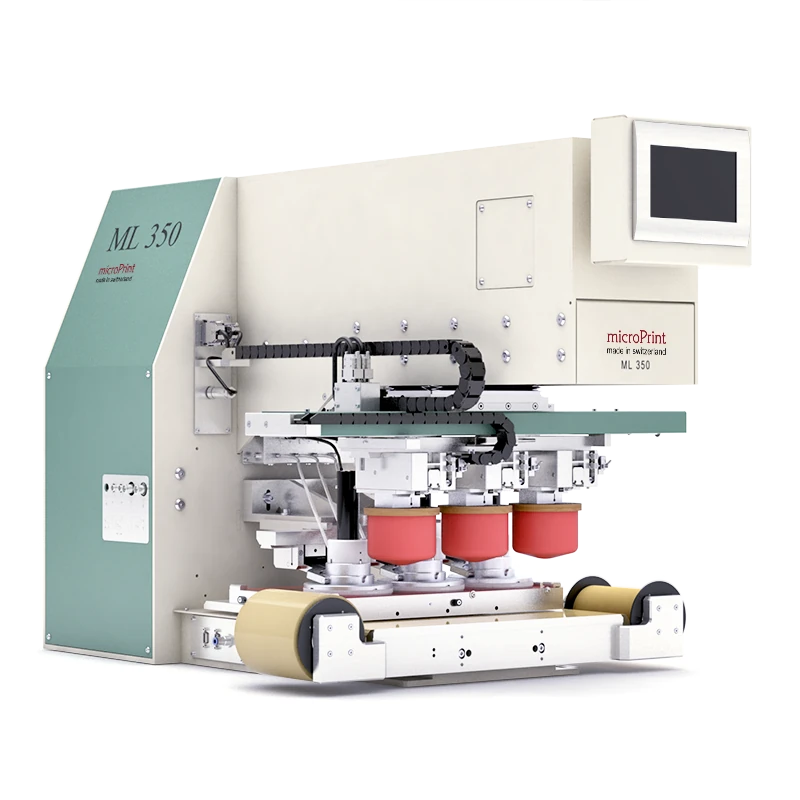
| Machine types | ML 350 |
| Number of colours | 1 - 5 |
| Speed [cycles/h] | 1,500/970 with pad cleaning |
| Drive – pad stroke | pneumatic |
| Drive – pad X-axis | Linear motor |
| Drive – pad y-axis | Linear motor |
| Drive – cliché | pneumatic |
| Cliché sizes max. [mm] | 400 x 300 x 0,5/10 |
| Cliché sizes for transverse doctoring unit max. [mm] | 130 x 600 |
| Ink cup [number x Ø in mm] | 5x56 / 5x70 / 4x86 / 3x120 / 2x140 |
| Print image max. [Ø in mm] | 46 / 60 / 76 / 110 / 130 |
| Pad stroke – force [N] | 1.750 |
| Pad stroke – travel distance max. [mm] | 140 |
| Pad projection max. [mm] | 160 |
| Pad cleaning | optional: 138 mm wide |
| Program memory size | approx. 200 |
| Interfaces | digital, Ethernet / optional: EtherCAT, Profinet, Ethernet IP, OPC UA |
| Thinning system | optional: 1–5 connections |
| Weight without base [kg] | approx. 171 |
| Air consumption [l/min] | 162 |
| Power supply | 110 – 240V, 50/60Hz, 250VA |
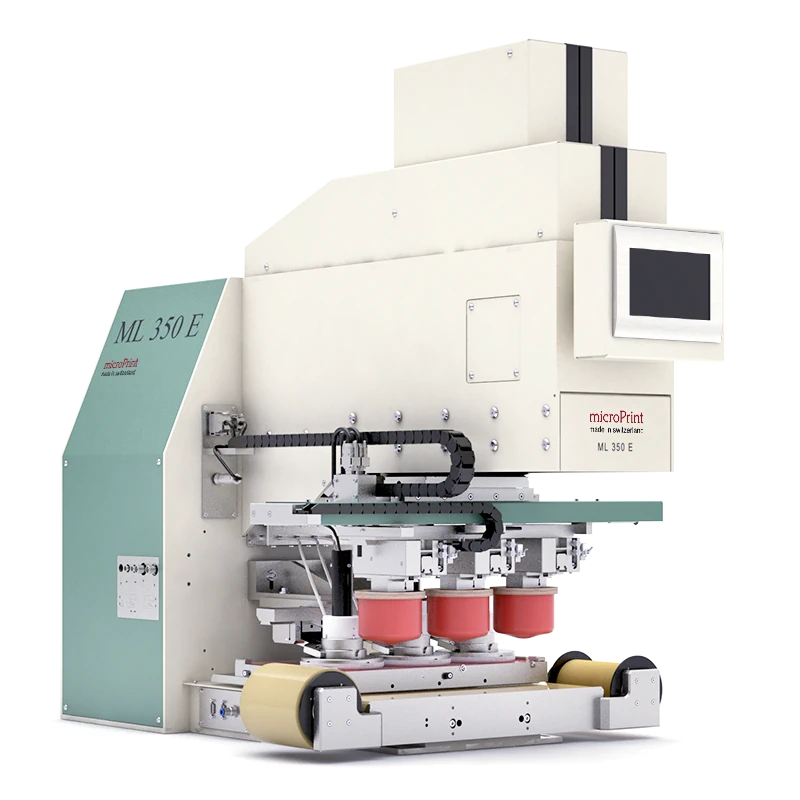
| Machine types | ML 350E |
| Number of colours | 1 - 5 |
| Speed [cycles/h] | 1,800/1,200 with pad cleaning |
| Drive – pad stroke | electric with servo motor |
| Drive – pad X-axis | Linear motor |
| Drive – pad y-axis | Linear motor |
| Drive – cliché | pneumatic |
| Cliché sizes max. [mm] | 400 x 300 x 0,5/10 |
| Cliché sizes for transverse doctoring unit max. [mm] | 130 x 600 |
| Ink cup [number x Ø in mm] | 5x56 / 5x70 / 4x86 / 3x120 / 2x140 |
| Print image max. [Ø in mm] | 46 / 60 / 76 / 110 / 130 |
| Pad stroke – force [N] | 3.000 |
| Pad stroke – travel distance max. [mm] | 140 |
| Pad projection max. [mm] | 160 |
| Pad cleaning | optional: 138 mm wide |
| Program memory size | approx. 200 |
| Interfaces | digital, Ethernet / optional: EtherCAT, Profinet, Ethernet IP, OPC UA |
| Thinning system | optional: 1–5 connections |
| Weight without base [kg] | approx. 225 |
| Air consumption [l/min] | 65 |
| Power supply | 110 – 240V, 50/60Hz, 600VA |

| Machine types | ML 500 |
| Number of colours | 1 - 7 |
| Speed [cycles/h] | 900/700 with pad cleaning |
| Drive – pad stroke | pneumatic |
| Drive – pad X-axis | Linear motor |
| Drive – pad y-axis | Linear motor |
| Drive – cliché | pneumatic |
| Cliché sizes max. [mm] | 520 x 340 x 0,5/10 |
| Cliché sizes for transverse doctoring unit max. [mm] | 130 x 800 |
| Ink cup [number x Ø in mm] | 7x56 / 6x70 / 5x86 / 4x120 / 3x140 / 3x160 |
| Print image max. [Ø in mm] | 46 / 60 / 76 / 110 / 130 / 150 |
| Pad stroke – force [N] | 3000 |
| Pad stroke – travel distance max. [mm] | 165 |
| Pad projection max. [mm] | 206 |
| Pad cleaning | optional: 138 mm wide |
| Program memory size | approx. 200 |
| Interfaces | digital, Ethernet / optional: EtherCAT, Profinet, Ethernet IP, OPC UA |
| Thinning system | optional: 1–7 connections |
| Weight without base [kg] | approx. 260 |
| Air consumption [l/min] | 290 |
| Power supply | 3x400V, 50–60Hz, 600VA |
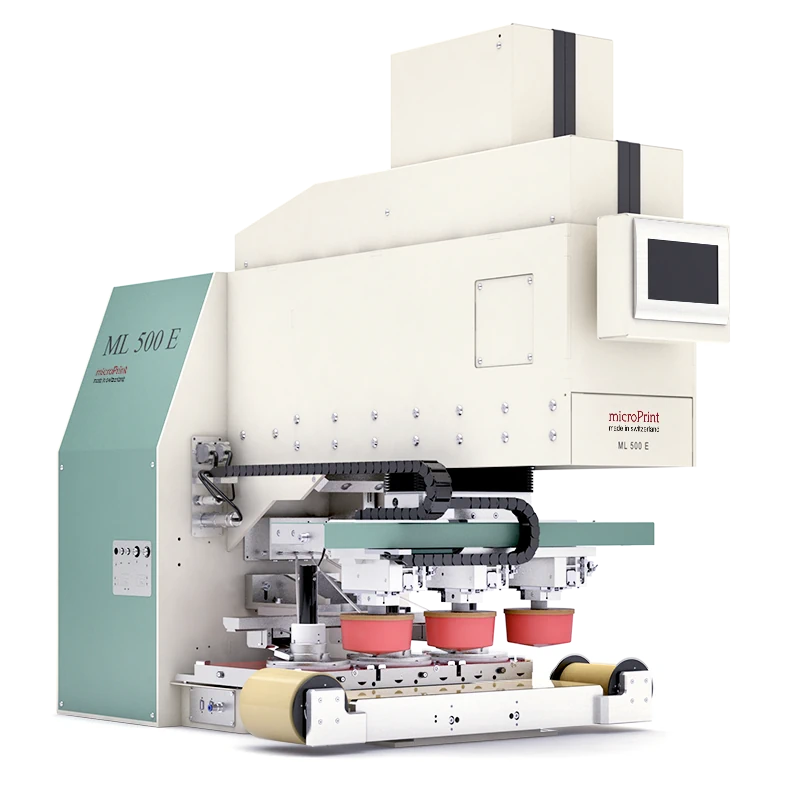
| Machine types | ML 500E |
| Number of colours | 1 - 7 |
| Speed [cycles/h] | 1,700/1,200 with pad cleaning |
| Drive – pad stroke | electric with servo motor |
| Drive – pad X-axis | Linear motor |
| Drive – pad y-axis | Linear motor |
| Drive – cliché | pneumatic |
| Cliché sizes max. [mm] | 520 x 340 x 0,5/10 |
| Cliché sizes for transverse doctoring unit max. [mm] | 130 x 800 |
| Ink cup [number x Ø in mm] | 7x56 / 6x70 / 5x86 / 4x120 / 3x140 / 3x160 |
| Print image max. [Ø in mm] | 46 / 60 / 76 / 110 / 130 / 150 |
| Pad stroke – force [N] | 6.000 |
| Pad stroke – travel distance max. [mm] | 160 |
| Pad projection max. [mm] | 206 |
| Pad cleaning | optional: 138 mm wide |
| Program memory size | approx. 200 |
| Interfaces | digital, Ethernet / optional: EtherCAT, Profinet, Ethernet IP, OPC UA |
| Thinning system | optional: 1–7 connections |
| Weight without base [kg] | approx. 305 |
| Air consumption [l/min] | 70 |
| Power supply | 3x400V, 50–60Hz, 800VA |

